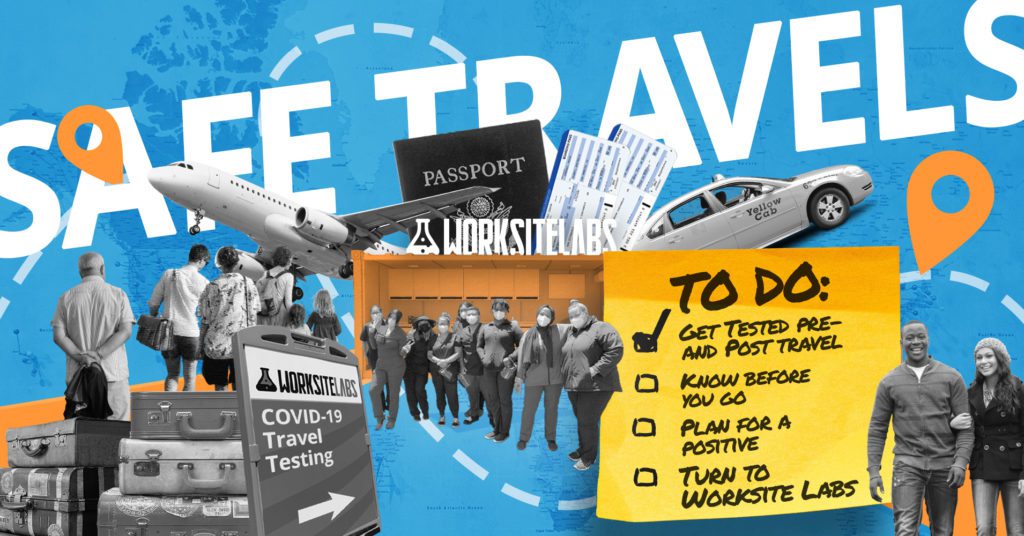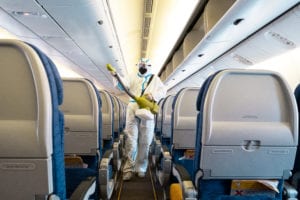By Gary Frazier
Family travel is back on the holiday table, with U.S. flights alone projected to transport more than twice as many passengers as this time last year. But even with the vaccine in place, travelers still need to follow standard precautions – including testing – to reduce the risk of spreading or catching COVID-19.
Even though U.S. holiday travel decreased in 2020 compared to 2019, it still contributed to a massive spike in COVID-19 cases last winter. Now, as we once again reach the most travel-heavy portion of the calendar and the U.S. has loosened travel restrictions for vaccinated individuals, the pandemic continues to spread dangerously, having now taken more than 5 million lives worldwide.
Further, long-term international travel bookings have increased noticeably in recent months (Delta Air Lines saw a 450% spike), despite the pandemic’s unpredictable nature. The deadly delta variant originated overseas and arrived here thanks to international travel, and it’s very likely this is how future variants can (or will) gain a foothold.
Pre- and post-travel COVID testing should be as predictable a part of your coming vacation itinerary as taking your shoes off at airport security. Testing can help to stop virus spread as you join loved ones for the holidays or visit countries where new, more powerful variants might originate.
As experts on testing and advocates for science-based practices, Worksite Labs can help you stay safe this winter. Here are four ways to protect your family from the coronavirus as you travel for the holidays.
1. Test before and after you visit family.
Last winter’s enormous spike in positive cases demonstrated just how risky in-person interaction can be during the pandemic, something the Centers for Disease Control and Prevention argued early on. The CDC continues to recommend delaying in-person gatherings for unvaccinated people this year, but the vaccine alone doesn’t remove the risk of holiday transmission. If inoculated people catch COVID (it does happen), they can still easily spread it to others.
Having a negative PCR test result in hand one to three days before you embark ensures that you aren’t bringing COVID-19 to your relatives. And by receiving one three to five days after your trip, you can identify any positive cases among your household and give early notice to anyone who’s been exposed. The earlier someone learns they’ve been infected, the better their chances of managing their symptoms. (Keep reading to find out what to do once you have your test results.)
2. Know your destination’s health mandates.
If you’re staying in the United States this winter, your destination probably doesn’t require proof of vaccination or a negative COVID test to enjoy certain activities. But there are exceptions — and it gets more complicated if you plan to leave the country.
Staying updated on the health mandates of where you’re traveling helps you prepare for any documentation you might need. If you’re remaining stateside, keep in mind that some big cities — New York, San Francisco and New Orleans, for example — now require proof of vaccination or a negative test for indoor activities.
Keeping up with requirements is trickier if you’re headed overseas, as countries can change their rules suddenly and often. You don’t want to get an antigen (rapid) COVID-19 test before reaching the airport, only to learn your destination now only accepts PCR test results.
3. Plan for every test (and every outcome).
Scheduling your pre- and post-travel COVID-19 tests in advance is essential, as virus spread is often erratic, and you can’t predict how in-demand providers might be.
Wherever your destination and departure point might be, researching and contacting nearby testing providers in advance can save you a major headache. The United States accepts antigen or PCR tests for returning citizens, so make sure you have adequate accommodations.
If you have a solid backup plan, there’s no need to panic after testing positive. Of course, if you test positive before leaving, simply stay home and follow the CDC’s guidelines. If you test positive after a domestic trip, notify anyone who’s been exposed.
If you’re traveling internationally, ask your hotel, hostel or other accommodations about your options if you test positive and can’t immediately return to this country. Some hotels will allow you to stay put as you quarantine, but it’s never safe to assume this is the case.
4. Whatever your testing needs, turn to Worksite Labs.
Worksite Labs has 20 drive-thru PCR testing stations near major U.S. airports. We provide nearly 100% accurate results within 24 hours, so you aren’t left waiting in case your plans need to change. You don’t need a boarding pass to visit one of our sites; simply book a test with our user-friendly scheduling portal.
International travelers can stay up to speed on health requirements at their destinations with our online Destination Guide. Our guide offers a thorough rundown on entry requirements for most countries, including what you need if you’re taking connecting flights through multiple nations.
The winter travel season can be fraught with anxiety, confusion and risk, especially with COVID-19 still active across the globe. With Worksite Labs’ travel-based testing services, anyone going anywhere for any reason can keep their next trip safe – and their loved ones protected.
Gary Frazier is the CEO of Worksite Labs.




